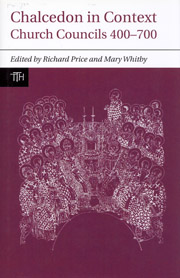Book contents
- Frontmatter
- Contents
- Abbreviations
- List of Contributors
- Introduction
- The Council of Chalcedon and the Definition of Christian Tradition
- ‘Reading’ the First Council of Ephesus (431)
- The Syriac Acts of the Second Council of Ephesus (449)
- The Council of Chalcedon (451): A Narrative
- Truth, Omission, and Fiction in the Acts of Chalcedon
- Why Did the Syrians reject the Council of Chalcedon?
- The Second Council of Constantinople (553) and the Malleable Past
- The Lateran Council of 649 as an Ecumenical Council
- The Quinisext Council (692) as a Continuation of Chalcedon
- Acclamations at the Council of Chalcedon
- An Unholy Crew? Bishops Behaving Badly at Church Councils
- Index
Introduction
- Frontmatter
- Contents
- Abbreviations
- List of Contributors
- Introduction
- The Council of Chalcedon and the Definition of Christian Tradition
- ‘Reading’ the First Council of Ephesus (431)
- The Syriac Acts of the Second Council of Ephesus (449)
- The Council of Chalcedon (451): A Narrative
- Truth, Omission, and Fiction in the Acts of Chalcedon
- Why Did the Syrians reject the Council of Chalcedon?
- The Second Council of Constantinople (553) and the Malleable Past
- The Lateran Council of 649 as an Ecumenical Council
- The Quinisext Council (692) as a Continuation of Chalcedon
- Acclamations at the Council of Chalcedon
- An Unholy Crew? Bishops Behaving Badly at Church Councils
- Index
Summary
The publication in three volumes in the series Translated Texts for Historians of a complete English translation with notes of the materials relating to the Council of Chalcedon (AD 451) by Richard Price and Michael Gaddis is a major event. For the first time this priceless dossier becomes readily accessible, and in English translation. This means that professional historians, theologians and students alike can have to hand in convenient form a collection of material which is of the utmost importance for understanding both the history of the Church and the history of late antiquity. Its publication coincides with the appearance of other works by historians dealing with church councils, in particular Fergus Millar's Sather Lectures, published in 2006, and related articles by him. Several recent works on the role of bishops in late antiquity, as well as many publications on the separation of the miaphysites, or non-Chalcedonians, in the sixth century, and on questions of orthodoxy and heresy, also underline the centrality of the negotiations and rivalries surrounding the ‘ecumenical’ councils of the fourth century and later.
The Church began from a very early date to resolve internal disagreements by means of meetings whose proceedings were in one way or another recorded; the earliest example is of course the debate within the Church of Jerusalem in the first century. In the context of a growing new religion which felt its mission to be universal, once the decision to proselytize among the gentiles had been made, local meetings (‘synods’) were ways of establishing communion, imposing order and designating hierarchy.
- Type
- Chapter
- Information
- Chalcedon in ContextChurch Councils 400-700, pp. 1 - 6Publisher: Liverpool University PressPrint publication year: 2011



